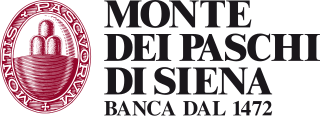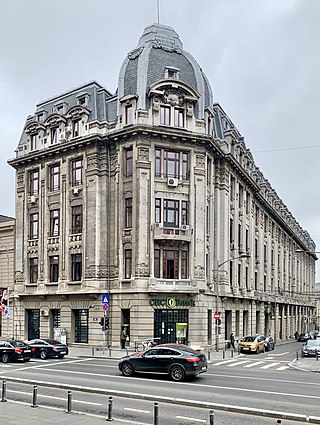The National Bank of Greece is a global banking and financial services company with its headquarters in Athens, Greece. It is the largest Greek bank by total assets.

Banca Monte dei Paschi di Siena S.p.A., known as BMPS or just MPS, is an Italian bank. Tracing its history to a mount of piety founded in 1472 and established in its present form in 1624, it is the world's oldest or second oldest bank, depending on the definition, and the fifth largest Italian commercial and retail bank.

Banca Antonveneta S.p.A. was an Italian bank based in Padua, Italy. The bank was absorbed into Banca Monte dei Paschi di Siena in 2013.

Banca Comercială Română (BCR) is a Romanian universal bank. It is one of the main banks in Romania and is a subsidiary of Erste Group.

UniCredit S.p.A. is an international banking group headquartered in Milan. It was Italy's only systemically important bank and the world's 34th largest by assets. It was formed through the merger of Credito Italiano and Unicredito in 1998 but has a corporate identity stretching back to its first foundation in 1870 as Banca di Genova. UniCredit is listed on the Borsa Italiana and Frankfurt Stock Exchange and is a constituent stock of the Euro Stoxx 50 index of leading shares.

Westdeutsche Landesbank was a major German bank based in Düsseldorf, mainly controlled by the German state of North Rhine-Westphalia. It was created in 1969 by the merger of two predecessor entities respectively for the Rhineland and Westphalia. As a Landesbank, WestLB's core business was wholesale banking on behalf of the region's Sparkassen, but it expanded into numerous risky activities that ultimately led to its restructuring and dismantlement in the late 2000s. As of 30 June 2012, the residual operations of WestLB were transferred to a legacy non-bank entity, Portigon Financial Services AG.
Libyan Foreign Bank (LFB) was established in 1972 in Tripoli, Libya as Libyan Arab Foreign Bank; it was renamed Libyan Foreign Bank in 2005. It was Libya's first offshore banking institution licensed to operate internationally. The Central Bank of Libya owns 100% of LFB. The head office is located in Libya's capital Tripoli.
Sebastian Teodor Gheorghe Vlădescu is a Romanian economist and politician. A former member of the National Liberal Party (PNL), he was the Minister of Public Finance of Romania in the first Călin Popescu-Tăriceanu cabinet and starting from 23 December 2009 in the Emil Boc cabinet.
China's banking sector had CN¥319.7 trillion in assets at the end of 2020. The "Big Four" state-owned commercial banks are the Bank of China, the China Construction Bank, the Industrial and Commercial Bank of China, and the Agricultural Bank of China, all of which are among the largest banks in the world As of 2018. Other notable big and also the largest banks in the world are China Merchants Bank and Ping An Bank.

The Bank of Romania, from 1903 Bank of Roumania Ltd., was Romania's oldest bank and its largest financial institution in the late 19th century, created and controlled by the Ottoman Bank until its nationalization in 1948.

Following the Iranian Revolution, Iran's banking system was transformed to be run on an Islamic interest-free basis. As of 2010 there were seven large government-run commercial banks. As of March 2014, Iran's banking assets made up over a third of the estimated total of Islamic banking assets globally. They totaled 17,344 trillion rials, or US$523 billion at the free market exchange rate, using central bank data, according to Reuters.
The Sweden financial crisis 1990–1994 was a housing bubble that took place in Sweden that deflated during 1991 and 1992, and resulted in a severe credit crunch and widespread bank insolvency. Similar crises took place in other countries around the same time, such as in Finland and the Savings and loan crisis in the United States. The causes of the crisis were similar to those of the subprime mortgage crisis of 2007–2008. In response, the government took the following actions:

The Icelandic financial crisis was a major economic and political event in Iceland between 2008 and 2010. It involved the default of all three of the country's major privately owned commercial banks in late 2008, following problems in refinancing their short-term debt and a run on deposits in the Netherlands and the United Kingdom. Relative to the size of its economy, Iceland's systemic banking collapse was the largest of any country in economic history. The crisis led to a severe economic slump in 2008–2010 and significant political unrest.
A bad bank is a corporate structure which isolates illiquid and high risk assets held by a bank or a financial organisation, or perhaps a group of banks or financial organisations. A bank may accumulate a large portfolio of debts or other financial instruments which unexpectedly become at risk of partial or full default. A large volume of non-performing assets usually make it difficult for the bank to raise capital, for example through sales of bonds. In these circumstances, the bank may wish to segregate its good assets from its bad assets through the creation of a bad bank. The goal of the segregation is to allow investors to assess the bank's financial health with greater certainty. A bad bank might be established by one bank or financial institution as part of a strategy to deal with a difficult financial situation, or by a government or some other official institution as part of an official response to financial problems across a number of institutions in the financial sector.

Erste Group Bank AG is an Austrian financial service provider in Central and Eastern Europe serving 15.7 million clients in over 2,700 branches in seven countries.
Veneto Banca S.p.A. is a former Italian bank headquartered in Montebelluna, Italy and currently a wind-down unit.

BCR Chișinău is a subsidiary of Banca Comercială Română (BCR) in the Republic of Moldova, member of Erste Group. BCR Chișinău is one of the first foreign capital owned banks in Moldova, which is a member of an international financial group.
Sareb is the bad bank of the Spanish government. Its purpose is to manage and disinvest high-risk assets that were transferred to it from the four nationalized Spanish financial institutions. The company was formed in 2012.

Banca Popolare di Vicenza (BPVi) was an Italian bank and currently a winding-down company. The banking group along was the 15th-largest retail and corporate bank of Italy by total assets at 31 December 2016, according to Mediobanca. However, its sister bank Veneto Banca also ranked 16th in the same ranking, making the whole banking group that under Atlante, had a higher pro-forma total assets than 10th of the same ranking, Crédit Agricole Italia. Due to its size, BPVi and Veneto Banca were both supervised by the European Central Bank directly, instead of the Bank of Italy.
Atlante is an Italian banking sector owned bail-out equity fund that is dedicated to recapitalize some Italian banks, as well as purchase the securities of the junior tranches of non-performing loans. It was established in 2015 in response to the Italian bad debt crisis of that year. The fund was under regulation by the EU Alternative Investment Fund Managers Directive.











